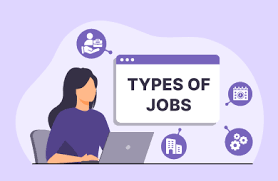
Types of Jobs Explained: Full-Time, Part-Time, Freelance & More
Types of Jobs: A Detailed Overview
In today’s fast-paced and ever-evolving world, choosing the right career path can be both exciting and overwhelming. With countless industries, roles, and opportunities available, understanding the different types of jobs is crucial for making informed career decisions. Whether you are a fresh graduate exploring your options, a professional considering a career change, or simply curious about the job market, this guide will help you understand the various job types, their characteristics, and the skills they typically require.
1. Full-Time Jobs
Full-time jobs are the most common type of employment. Typically, these positions require employees to work around 35-40 hours per week, and they often come with benefits such as health insurance, retirement plans, and paid time off. Full-time employment provides stability, a regular income, and opportunities for career advancement.
Advantages:
-
Job security and steady income
-
Access to employee benefits
-
Opportunities for promotions and growth
Examples:
-
Software developer at a tech company
-
Teacher in a school
-
Accountant in a financial firm
Full-time roles are ideal for individuals looking for stability and long-term career growth. However, they may require a higher level of commitment, limiting flexibility for personal projects or side hustles.
2. Part-Time Jobs
Part-time jobs involve working fewer hours than full-time roles, often ranging from 10 to 30 hours per week. These positions are suitable for students, parents, or anyone looking to supplement their income while maintaining flexibility in their schedule.
Advantages:
-
Flexible work hours
-
Opportunity to gain experience while studying or managing other responsibilities
-
Less commitment than full-time roles
Examples:
-
Retail store assistant
-
Freelance writer
-
Tutor or teaching assistant
Part-time roles provide flexibility and work-life balance but may come with limited benefits and lower pay compared to full-time jobs.
3. Freelance Jobs
Freelancing has gained immense popularity in recent years, offering individuals the freedom to work on multiple projects independently. Freelancers are self-employed and often work with several clients, providing services in exchange for payment.
Advantages:
-
Flexibility in choosing projects and working hours
-
Potential for higher income based on skill and demand
-
Opportunity to work with multiple clients and industries
Examples:
-
Graphic designer working with startups
-
Content writer creating articles for various websites
-
Web developer building websites for small businesses
Freelancers must have strong time management and self-discipline skills since they are responsible for managing their own workload, client communication, and finances.
4. Temporary or Contract Jobs
Temporary or contract jobs are positions that are offered for a fixed period, often to cover seasonal needs, specific projects, or employee absences. These roles can range from a few weeks to several months.
Advantages:
-
Exposure to different industries and work environments
-
Networking opportunities for future employment
-
Flexible work arrangements
Examples:
-
Event coordinator for a wedding or corporate event
-
Seasonal retail staff during holidays
-
IT consultant for a project-based assignment
While temporary roles provide experience and networking opportunities, they may lack long-term job security and benefits.
5. Remote Jobs
Remote jobs allow employees to work from any location, eliminating the need to commute to an office. Remote work has become increasingly popular due to advancements in technology and the rise of global collaboration.
Advantages:
-
Flexibility in work location and hours
-
Cost savings on commuting and relocation
-
Opportunity to work with international teams
Examples:
-
Customer support representative for a tech company
-
Digital marketing specialist managing campaigns remotely
-
Online language tutor
Remote roles require strong communication, self-motivation, and technical skills to stay productive and connected with the team.
6. Government Jobs
Government jobs offer employment within public sector organizations at local, state, or national levels. These jobs often provide stability, benefits, and a structured career path.
Advantages:
-
Job security and pensions
-
Fixed work hours and leave policies
-
Opportunities for professional development and promotions
Examples:
-
Civil servant in administrative services
-
Police officer
-
Teacher in a government school
Government roles are highly sought after for their stability, but the selection process can be competitive and time-consuming.
7. Entrepreneurial Roles
Entrepreneurial roles involve starting and managing your own business. Entrepreneurs take on the risks and rewards of creating a product or service and building a company.
Advantages:
-
Complete control over business decisions
-
Potential for high income and growth
-
Opportunity to innovate and pursue passions
Examples:
-
Owner of a startup tech company
-
Founder of a retail store
-
Freelancer scaling into an agency
Entrepreneurship requires resilience, risk tolerance, and a broad skill set, including marketing, finance, and management.
8. Internship and Apprenticeship
Internships and apprenticeships are learning-focused positions designed for students or early-career professionals to gain practical experience in a specific field. These roles often lead to full-time employment opportunities.
Advantages:
-
Hands-on learning experience
-
Networking and mentorship opportunities
-
Possibility of securing a permanent job
Examples:
-
Marketing intern at a digital agency
-
Engineering apprentice at a manufacturing company
-
Research assistant at a university lab
Internships are valuable for skill development and understanding workplace dynamics, even if they are temporary and sometimes unpaid.
Conclusion
Choosing the right type of job depends on individual goals, lifestyle preferences, skills, and career aspirations. Full-time and government jobs offer stability and benefits, part-time and freelance roles provide flexibility, while entrepreneurial ventures allow independence and innovation. Understanding the different job types is essential for making informed decisions and building a fulfilling career.
FAQs
1. What is the main difference between full-time and part-time jobs?
Full-time jobs require a standard number of working hours (usually 35-40 hours per week) and often come with benefits, while part-time jobs involve fewer hours and provide more flexibility but usually offer limited benefits.
2. Can freelance jobs provide a stable income?
Freelancing can provide a stable income if you consistently secure projects and build long-term client relationships. However, income may fluctuate, so financial planning is essential.
3. Are remote jobs suitable for all professions?
Not all professions can be performed remotely. Jobs that require physical presence, such as healthcare, construction, or retail, typically cannot be fully remote. However, many digital, administrative, and creative roles can be done from home.
4. What skills are important for government jobs?
Government jobs often require discipline, analytical thinking, communication skills, and knowledge specific to the field. Competitive exams, interviews, and selection criteria vary based on the role and country.
5. How can internships help in career growth?
Internships provide practical experience, industry exposure, and networking opportunities, which can lead to full-time employment and better understanding of career paths.



